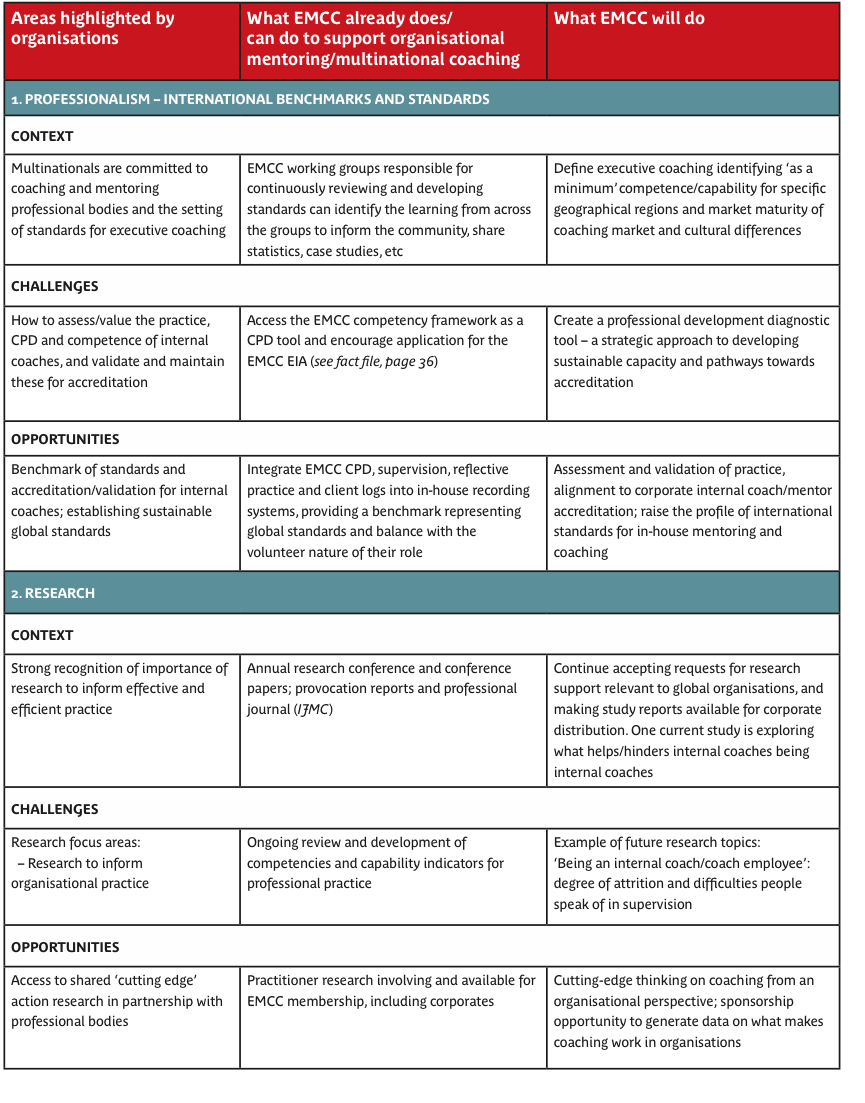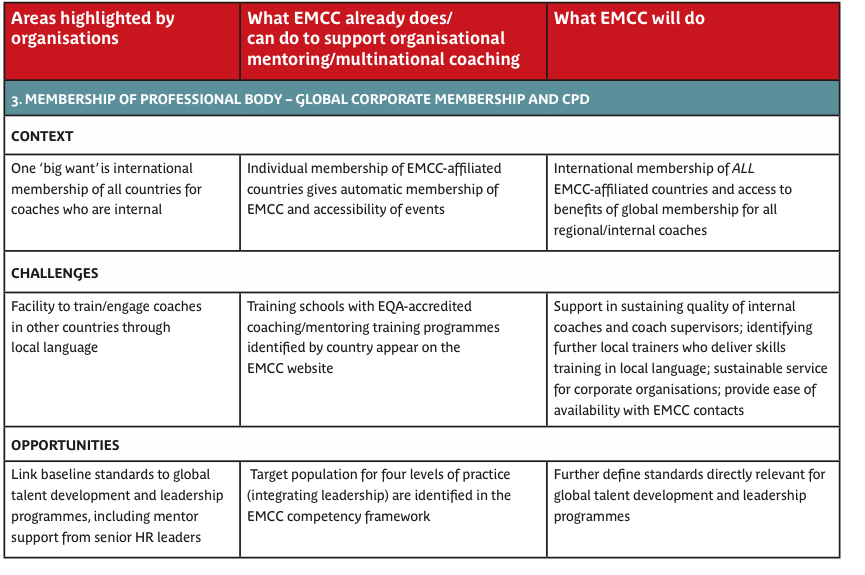A study from the European Mentoring & Coaching Council on internal coaching highlights what support multinationals need, what the EMCC is already offering, and what it plans to offer, and invites responses from other professional bodies too.
Lise Lewis reports
It is now the norm for organisations to have an internal coaching capability, and 75% of organisations expect this to increase over the next two years, according to the 6th Ridler Report published last year (2016) with European Mentoring & Coaching Council (EMCC) UK.
Along with the predicted further growth of internal coaching, there have been observations generally within the industry not only about organisations’ desire for support in delivering best practice in this area, but also in some cases a lack of information or awareness about what’s already on offer. This scenario gives scope for professional bodies to demonstrate what they already offer, and what’s also needed and what they will provide in future in supporting organisational coaching.
In the case of EMCC, this scenario ignited an impetus to increase existing cooperation between EMCC and global corporates. This idea flourished and became a qualitative study producing data from one-to-one interviews with a sample of organisations known to engage in developing and delivering organisational coaching.
This article shares some of the findings from the EMCC global corporates study, and explores what some participating global organisations and EMCC-affiliated countries have to say. All participants have a global presence and are currently engaged with organisational coaching. As well as coaching, the study explored mentoring given EMCC’s additional expertise in this domain and that this forms part of organisational practices.
Asking about current practices and how interviewees believed professional bodies can provide support validated the belief that EMCC has scope for promoting services. It also informs how EMCC and other professional bodies can develop future services.
Areas explored
Organisations highlighted the following overarching themes in internal coaching:
- Professionalism – international benchmarks and standards
- Research
- Membership of professional body – global corporate membership and CPD
Delving deeper, they shared thoughts on:
- Context
- Challenges
- Opportunities
The study also highlights what the EMCC:
- is already offering to support current and future organisational mentoring and coaching
- will action to further add value
Conclusions
In conclusion, there is a strong indication that global organisations welcome the support of professional bodies in growing and professionalising their in-house function and that EMCC and others can do more.
We believe EMCC is strategically positioned to develop these working relationships and we invite all professional bodies to cooperate with us in this aim.
- To get involved, contact Lise Lewis: emcc.president@emccouncil.org
- For EMCC accreditations, contact Denise Whitworth:
emcc.vp.accreditation@emccouncil.org - Dr Lise Lewis is president of EMCC International
Reference
- 6th Rider Report: Strategic Trends in the Use of Coaching (May 2016)
www.ridlerandco.com/ridler-report
FACT FILE:
EMCC
- EMCC is an independent not-for-profit professional body with European roots and with global representation in 89 countries.
- Its aim: to develop, promote and set the expectation of best practice in mentoring and coaching across Europe and beyond, for the benefit of society.
- Its vision: to be the ‘go-to’ body in mentoring and coaching based on a foundation of research and developing industry standards for the past 25 years.
- EMCC research has informed competency frameworks and accreditations available to individual practitioners, providers of coaching/mentoring/supervision training and organisations with internal coaching/mentoring programmes.
Download EMCC competency frameworks for coaching/mentoring and supervision here:
www.emccouncil.org
Accreditations
- EQA: For those delivering coach/mentor training including in-house course(s) who demonstrate equivalence to international quality standards for professional practice.
- EIA: For individuals responding to growing demand for external coaches to be accredited and internal practitioners to be similarly accredited.
- ESQA: Organisations are optimising their investment in training internal coaches/mentors, together with accepting an ethical responsibility for supporting and developing their internal practitioners through supervision. Accredited supervision training is a growing sector in the mentoring/coaching industry.
- ESIA: Similar to the EIA, appropriate for coach/mentor external and internal supervisors.
- ISMCP: The latest EMCC accreditation designed for organisations to benchmark their internal coaching/mentoring programmes with good practice quality standards.
What organisations say…
“The EMCC EQA process provided us with a solid and rigorous framework with which to assess the quality of what we were setting up. The human contact with EMCC helped us in asking the important questions and in looking hard at how we were working as a project team. That connection, plus the continued encouragement from EMCC to keep standards high has also meant that we have maintained a gentle but continuous effort to improve what we do. The foundation level is very attractive in a business. It puts the ambition in the system while keeping it at an attainable level for people who are not just coaches.”
Head of internal coaching scheme in a European manufacturing organisation. The scheme has 25 coaches working across the organisation from Italy, France, Belgium, UK and Poland
“A key focus for the coaches is to maintain their practice, by participating in supervision group meetings and pushing the organisation to deliver continuous coachee demand for their services. A key challenge for the coaches is how to develop their practice by gaining new skills, through being able to access CPD, and by connecting with other coaching schemes. EMCC could play a key role by working with internal coach schemes to connect their coaches to practice development opportunities, and to foster networking of these groups, bringing them out into the light.”
EMCC UK
Has been developing corporate memberships and partnerships for several years, learning from experience what kind of support is valued by organisations. It currently has more than 100 corporate members, working in different ways depending on members’ “needs and aspirations”.
“At the heart of this is EMCC’s role in making connections, not only between corporate members and partners, but with the communities of which they are part – their employees, customers, clients and other stakeholders. This was exemplified in September when EMCC UK spearheaded the first conference focused exclusively on internal coaching and mentoring. In collaboration with internal coaching member organisations in Holland, Belgium and France, it brought together programme leads and practitioners from four countries to share learning and experience.”
The conference grew out of a need expressed by UK large corporate members for an event focused on their needs as internal coaching and mentoring practitioners, which was echoed by those in the other three countries. The conference will now become a regular event, hosted by each participating country in turn.
The UK’s large corporate members identified this and other needs when they came together in 2015 as an Internal Coaching & Mentoring Strategy Group. A menu of needs and aspirations was identified which is currently being addressed.
EMCC UK’s large organisation liaison programme provides each large corporate member and partner with a dedicated volunteer as its single point of contact. Among current benefits is a free CPD event provided by an EMCC UK member.
EMCC UK has recognised the importance of peer groups and brings together different types of corporate members, and non-members, to address coaching and mentoring issues they all face, good practice they can share and knowledge and experience they and EMCC can contribute.
EMCC Ireland
Has formed and facilitates an advisory panel of senior HR specialists with responsibility for coaching and mentoring initiatives within their respective organisations. The group meets monthly to share ideas and discuss best practice. The panel “enhances the profile of EMCC in Ireland among corporate buyers of coaching services, provides us with a forum to promote the professional development of coaching and mentoring and gives us views on potential topics and speakers for our events’’.
EMCC France
- Is currently on an “extremely effective Tour de France” explaining EMCC offerings to coaches and clients
- Has developed a “professionalisation programme” covering subjects like competencies, ethics and accreditation. In-house coaches are especially interested in ethics generally and the Global Code of Ethics
- Is facilitating an internal coaching working group, welcoming both coaches
and clients. At its last gathering, an internal coach from the British Embassy discussed coaching, supervision and use of technology in the network of coaches and supervisors - Has a group exploring how best to organise supervision in a “strong coaching culture” environment, looking in particular at which is the most effective way to do coaching supervision in this context and whether new techniques are needed, and asking organisations about accreditation, supervision and ethics.


